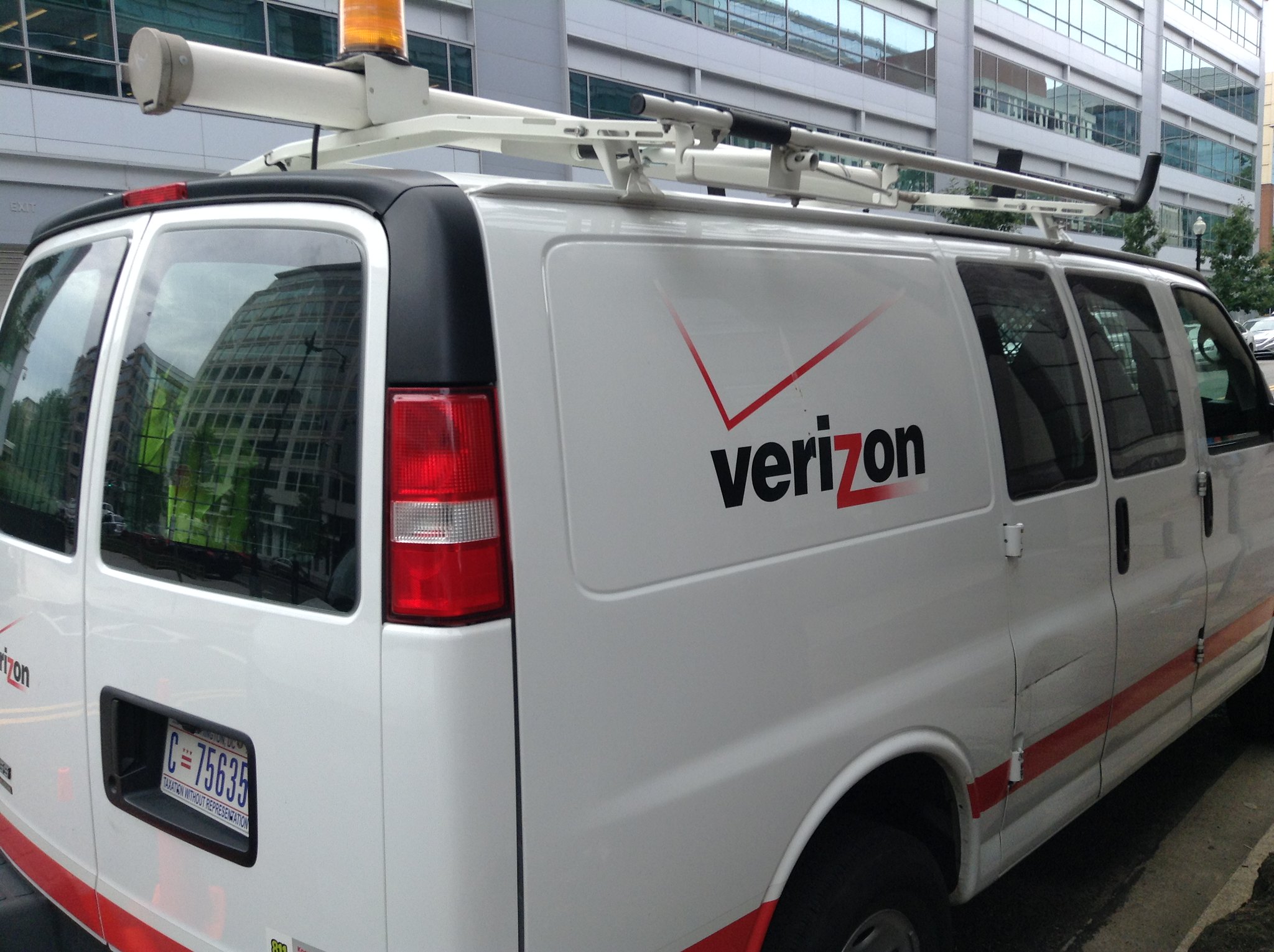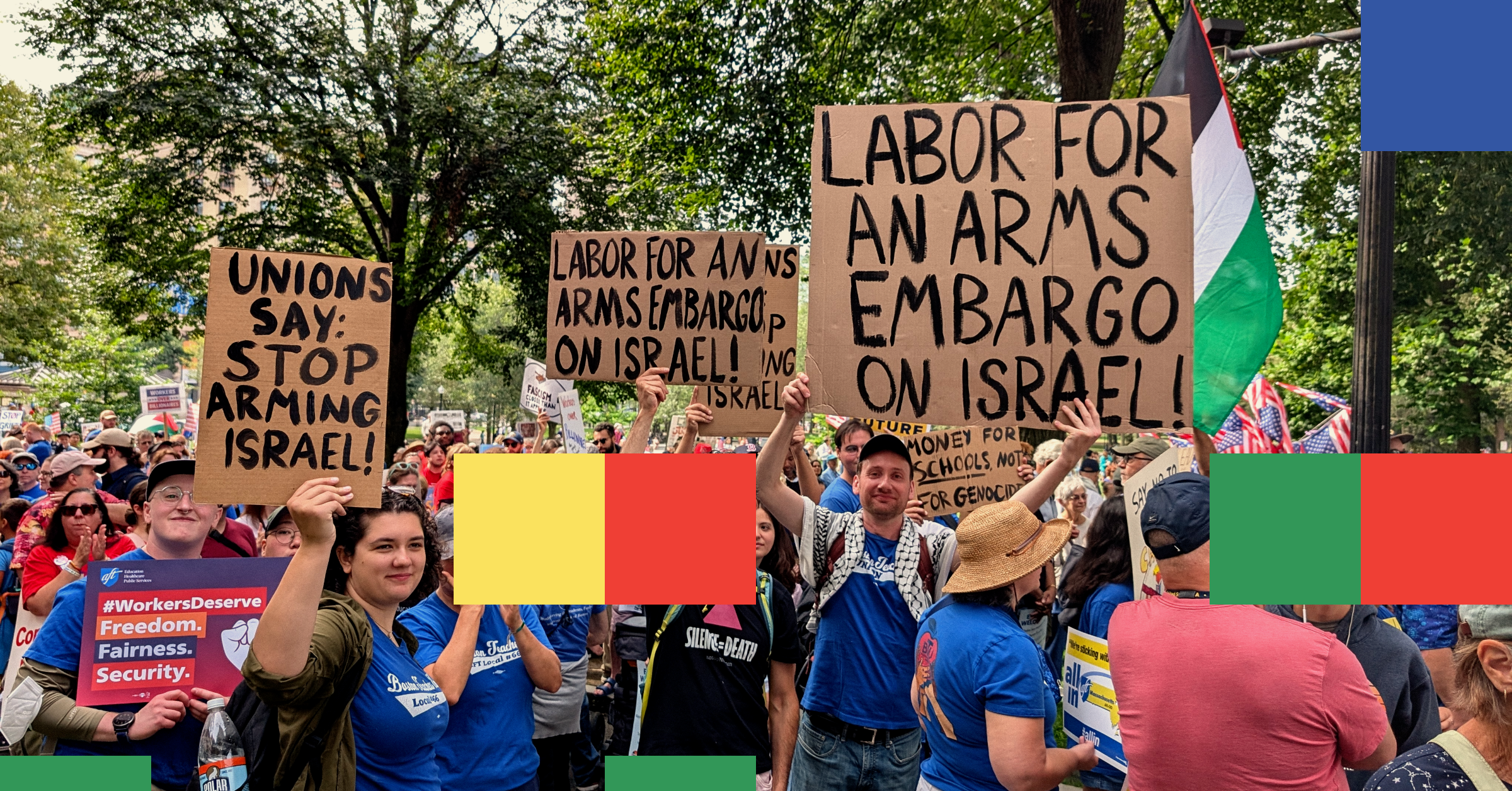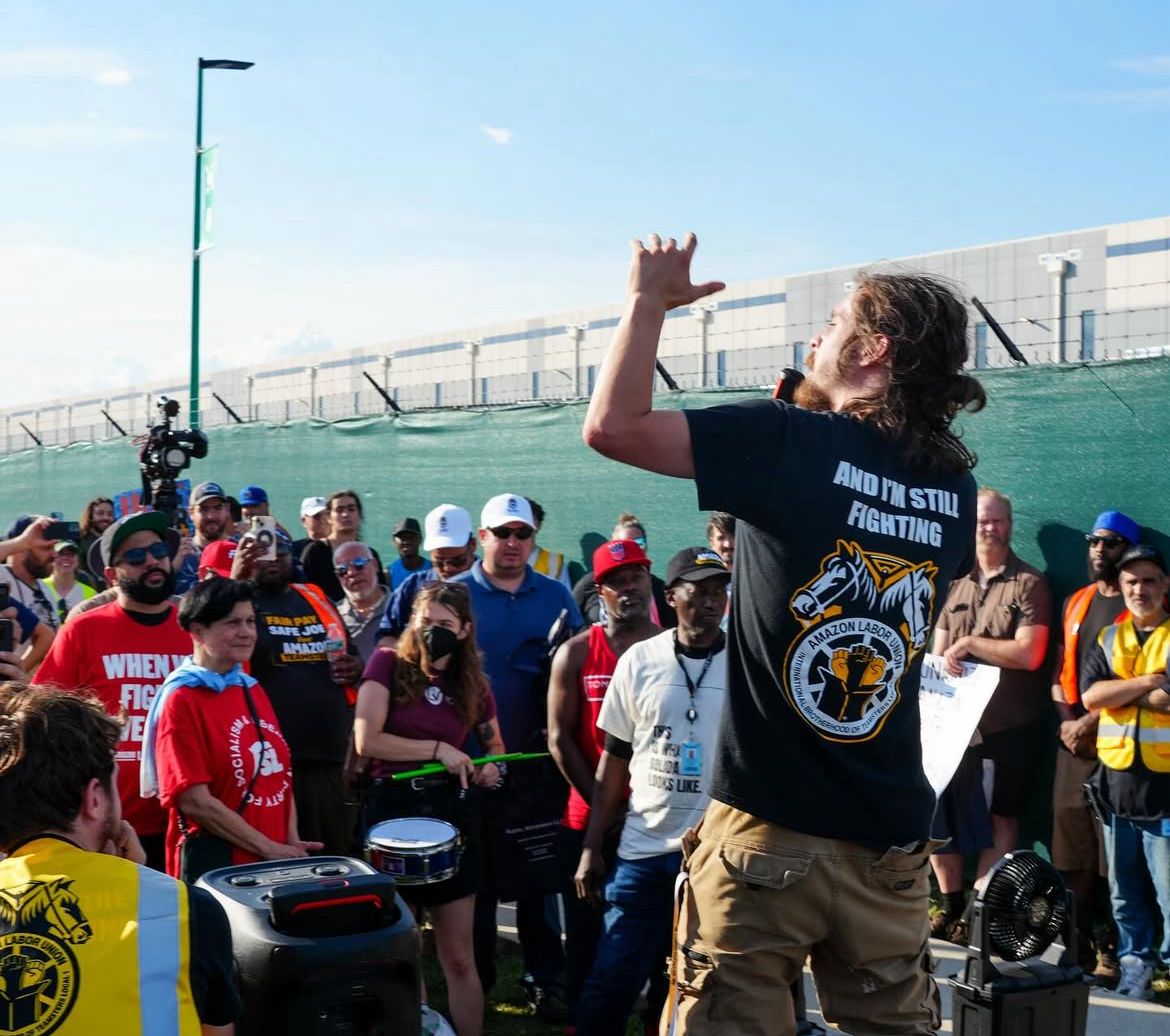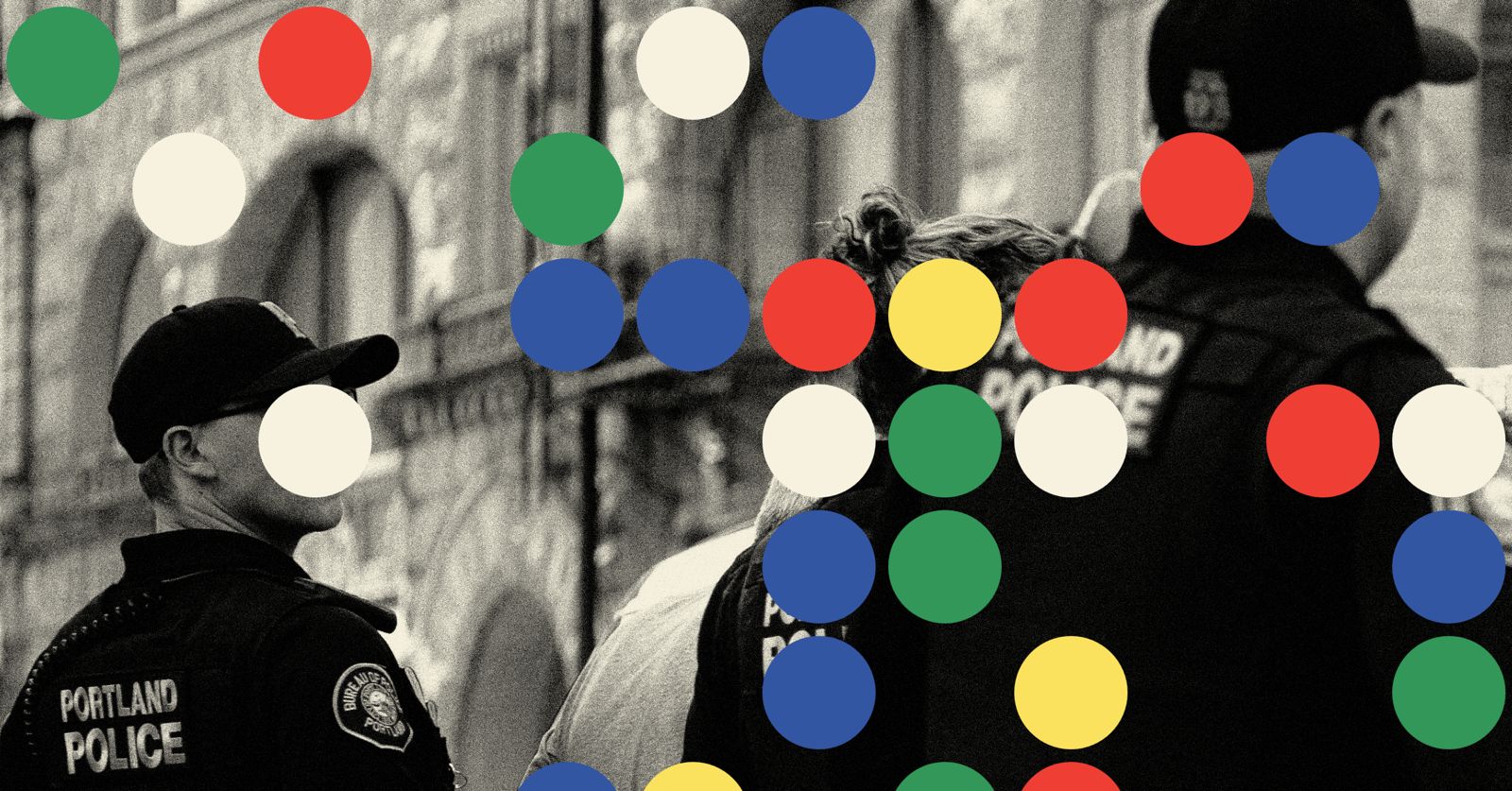Fred Rosen (a pseudonym) started at Verizon three years ago. He’s a lineman, one of the categories of field technician. Here, Rosen talks to The Call about his experiences on the job and as a union activist. [Also see our interview with a 21-year Verizon activist.]
What’s your job like day to day?
A lineman does construction and maintenance of the physical elements of the plant. We place and remove telephone poles, we run cable up in the air on the poles or underground in manholes, we bring the cable into the building, and we set up equipment. Someone comes behind me and splices, and then others actually put it into individuals’ homes.
We also respond to failures — a failure in the cable or a vehicle accident or a tree falls, that might happen in the middle of the night, so we’re called out.
Is it pretty physical?
It is a heavy job. There are not a lot of women. Out of maybe 50 linemen in my garage, there are maybe two women.
Before my cohort was hired, the company essentially hadn’t hired in over 15 years. After three years, we just hit top pay, $45 an hour. The people they hired were mostly in their late 20s to mid-30s. I was 30 at the time. Of the older techs, from 17 years ago on back, about two-thirds are white and a third are Black. For my cohort, it’s the reverse.
How did you decide to get a union job?
There were a variety of reasons. Starting from the least political — I wanted a secure job that I could make my career and plan the rest of my life on. I was getting older, I wanted a job where I knew what my life would be like.
I’ve worked in the service industry and in white-collar settings, and I hate both. I can’t stand dealing with customers, I hate the dynamic between the boss and the employee in a service-sector job. I remember when I worked in food service, my boss saying, “You should smile more.” I wanted a more physically active job. I like that kind of work.
A slightly more political reason: I had worked for a time in an activist job where all my coworkers were left-wing, at least progressive if not outright socialists. Great people to work with, but I personally don’t like only being around people who see the world the same way I do. Living in a bubble. It’s hard to know what politics work in the world when everybody around you agrees with you. I’m in DSA, and I already spend a lot of time with people who agree with me outside of work.
Most political was the ideas of the rank-and-file strategy. If we believe in socialism and want to fight to win it, we have to look at the group of people who have the most power and the interest in changing the system. That’s the working class, and the working class has the most power at work.
I’ve spent a lot of time attempting to organize the unorganized into unions, both among coworkers and as a professional organizer. It’s critically important, but it has shortcomings. You tend to not make the same kind of long-term relationships. For example, I worked in some service-sector jobs where I tried to organize, but I was not going to work 20 years in those jobs. And especially as an outside organizer, you meet people and then you’re on to the next campaign.
With a rank-and-file job, you’re making relationships you’re going to develop over decades. It’s a deeper kind of organizing.
My experience organizing in nonunion workplaces and my understanding of history — we might be able to organize a hot shop here and a hot shop there, but to really organize numbers that count is going to take an upsurge, a moment of militancy. I think the best way to get there is to change the existing unions. I have examples from my life where I saw efforts to organize the unorganized and people were banging their heads against the wall. But when militancy grew in a union shop in the same industry, it suddenly created a breakthrough in the nonunion shops.
The other thing is that there’s generally no militancy in a union shop or in a nonunion shop, but it’s just easier to create militancy in a union shop. Because there’s a sense of security and a sense of collectivity. The courage it takes to confront your manager in a nonunion shop is astronomical compared to the courage it takes in a union shop. Workers’ attitude changes, even when the union sucks, which it doesn’t where I work.
I think it’s best to start from strength and build out from there. Foment militancy where we have strength. That’s the best way to organize millions, not thousands.
Why did you want to work at Verizon?
The biggest reason is that I knew people at Verizon who told me how great a job it was. I was familiar with the union already. CWA [Communications Workers of America], at least at Verizon, is already a very strong union. Compared to the rest of the labor movement, the level of militancy is pretty high. Also the level of democracy. But it’s useful to have socialists in those places so we can learn what good unionism looks like. CWA is very progressive. If there’s any union we could push to be more than “vote blue no matter who” or take the lead in something like a labor party, CWA would be it.
What do you like best and least about the job?
I absolutely love my job. I feel really fortunate every day. If we won socialism tomorrow, I’d still want to be a lineman.
The best part of it is the high degree of freedom, considering it’s still capitalism, and we’re still workers. That comes from the nature of the work. It’s often very hard for a boss to come check on us while we’re working. Also, there are a ton of safety specs about how to do the job. We often go above and beyond in order to get the job done, so management has to give us the space to do that, or most jobs could not be done. That gives us a lot of power and a lot of freedom.
The work itself is interesting. It’s puzzle-solving. It’s not high-skill manual labor in the sense of detailed work; everything I do is with something big. It takes a degree of skill, and it’s also physically exerting, a good combination of mind and body.
Plus you work as a team. You have a group you work with every day who you get really close to. My team just changed, but the team I’d been with for the last three years, these are my close friends.
What I don’t like about the job is there’s not a lot of time off. After one year, I got two weeks of vacation, and I don’t get another week till I reach year 7. We get 4 sick days, 4 personal days, and 10 holidays.
Were there things about the job or the union or your coworkers that surprised you?
How little the national union’s program filters down to the rank and file. CWA endorsed Bernie eight years ago — that stuff is almost totally absent from the shop floor.
Talking with the new guys during the 2020 primaries, the room was split between Bernie, Trump, and “I don’t care, I’m not talking about it.” Trump was a tiny minority. Bernie was tied with those who didn’t talk about it. There was not one person in my garage who talked about Biden or Elizabeth Warren.
Are there day-to-day things you do that you could describe as political, or is that more peaks and valleys?
The new guys were not in the 2016 strike. Most of us have not had union jobs before. I became a steward after about one year. We’ve had a lot of struggles between us and management, especially over some of the new guys not being treated as well as we should have been. Those were fights over basic stuff like management harassing people or not divvying overtime in a fair way. As I said, we do a lot to make sure our job gets done. We have to follow the rules at work, but we don’t have to go above and beyond. That gives a sense of collective action and a sense of trust, it builds workplace leaders, so when bigger struggles arise as they inevitably will, we will be ready to take more aggressive action.
When Black Lives Matter started popping off, we talked about it all the time. We debated it between white coworkers, Black coworkers, it was sometimes tense and rough. I don’t know if the older techs were moved at all, but among the younger ones some cross-racial trust was built. Younger techs participated in some of the marches that had never done that before.
How did you get elected steward?
Because of the age and experience gap between the old techs and the new techs, it feels like two groups at work. We had stewards already who were senior techs, but they didn’t have natural leadership among the new group. We had a sense of community among ourselves. Then amongst us, I have a decade-plus of organizing experience, so I had an idea of what to do. When you have an idea of what to do, it’s easy to take a position of leadership, because people want that. I didn’t have to go out and create a problem, problems were there that people wanted dealt with.
Also, I spent a lot of time memorizing the contract in a nerdy way. Especially sections relevant to us as new hires. I knew that backward and forward.
The last thing is you have to be a people person. With very few exceptions, I was at least friends with everybody in the shop. I like getting to know people from different experiences. I developed my close friends, the group I want to hang out with outside of work, but, if you’re interested in organizing, you have to maintain good relationships with people who aren’t in your clique.
It really made a big difference, being a steward. I was surprised how much. And when I stopped being a steward when I changed garages as well. When I say something, I’m not just some dude spouting my opinion, people are more likely to take it seriously and consider it. They’ve said, “This is the person we want to have this title”; that has weight. And obviously it makes a difference with management; by law they have to talk with you. And being a steward, you could just call meetings.
What have been the highlights thus far?
On a personal level, the highlight is the people. I really love my coworkers. I just can’t say how glad I am to be here. Every day I am so goddamn lucky.
Politically, it was during the peak of the Black Lives Matter struggle, being able to join coworkers outside of work in the streets and being able to take that fight back into the workplace. To a lackluster amount, but not irrelevant, CWA did promote bringing Black Lives Matter into the workplace. We did an eight-and-a-half-minute work stoppage for Black Lives Matter called by CWA. In my shop, it was not a work stoppage, it was a photo op, nothing confrontational at all. But it was the union saying to members, “This is an important issue we have to deal with, at work.” And that counts for a lot.
Mostly it was stuff directly between coworkers. This was a moment when some of my coworkers really showed leadership. Part of the nature of our job is we talk to each other in detail about every imaginable subject. Black Lives Matter is no exception. Among the people who were pro-Black Lives Matter, mostly my black coworkers but not only, there was a deep debate about what it takes to get change, including the effectiveness of different levels of violence. Some people said unless Black people are ready to get guns and have a literal revolution, it’s all playtime. And other people said, “I support the protests but not the rioting.” Most of it was theoretical because most of them were not actually engaged in the struggle. But many people did come out and join the protests at various spots, often we would do it together.
There was a generally heightened racial environment, and there was some conflict. Among the younger technicians, those were usually productive. Some white coworkers made an effort to try to learn and listen and actually change themselves. It was a maturing experience for all involved.
What’s your advice for people who want to get a union job and want to organize there?
My first piece of advice is don’t wait. There’s a million reasons to do other things, but don’t wait. If I was going to go back and give my 22, 23-year-old self advice, I’d be a lot further ahead on a personal level and on an organizing level. I was always doing some kind of organizing, and I’d think, “This is so important, I’ll get a job when it’s over.” But I have coworkers who started at 21, and they’re making top pay at 24.
Another piece of advice is don’t sacrifice your life for it. If it’s some job you’re going to hate, don’t do that. If you can’t do it for the long haul — one of the things that makes getting a union job useful as as political tactic is the deep organizing you can do over a long period of time.
The last thing I would say, the politics is only one part of it. If you go in and you’re treating it like an organizing job, you’re not being real with your coworkers. Are you going to be a “plant” your whole life? That’s not a fulfilling way to be. You’d be setting yourself apart. My parents always thought I was going to be a lawyer, but I love this job, I love my coworkers.




